2016年英语四级作文范文假期症
- 格式:docx
- 大小:13.39 KB
- 文档页数:2

英语四级作文练习题和范文题目要求:Directions: For this part, you are allowed 30 minutes to write a short essay entitled Post-holiday Syndrome Among Students. You should write at least 150 words following the outline givenbelow.1. 很多学生在开学伊始都会出现假期综合症2. 出现这一现象的原因3. 我的建议参考范文:Post-holiday Syndrome Among StudentsWith the gloomy prospect of returning to school, many students couldsuffer from post-holiday syndrome, which refers to a general feeling of depression before returning to campus life, whichis caused by irregular lifestyles during the holiday. Symptoms include fatigue, lack of appetite and concentration, irritability and a feeling of helplessness.Various reasons can account for it. But most important of all, a large number of students tend to overindulge themselves in eating, merrymaking and playing around during the holidays, whichmakes it difficult to adjust to their routine study schedule and life pace on the campus.My suggestions to deal with this syndrome are as follows. First, exercising and sticking to a normal schedule over the holidays will make a difference and nip post-holiday syndrome in thebud. Besides, it pays to return a few days earlier before the semester starts. The early return seems to have kept the holiday blues at bay.题目要求:College Students’Living Condition1. 反应大学生生存状况的词语从“蜗居”、“蚁族”到“鼠族”,不断涌现。
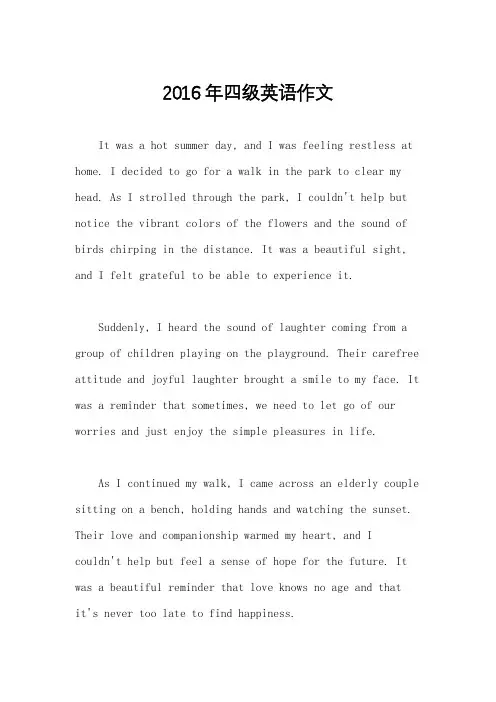
2016年四级英语作文It was a hot summer day, and I was feeling restless at home. I decided to go for a walk in the park to clear my head. As I strolled through the park, I couldn't help but notice the vibrant colors of the flowers and the sound of birds chirping in the distance. It was a beautiful sight, and I felt grateful to be able to experience it.Suddenly, I heard the sound of laughter coming from a group of children playing on the playground. Their carefree attitude and joyful laughter brought a smile to my face. It was a reminder that sometimes, we need to let go of our worries and just enjoy the simple pleasures in life.As I continued my walk, I came across an elderly couple sitting on a bench, holding hands and watching the sunset. Their love and companionship warmed my heart, and Icouldn't help but feel a sense of hope for the future. It was a beautiful reminder that love knows no age and thatit's never too late to find happiness.As the sun began to set, I made my way back home,feeling rejuvenated and at peace. The simple act of takinga walk in the park had brought me so much joy and gratitude. It was a reminder that sometimes, we need to take a step back and appreciate the beauty that surrounds us.。
![[英语六级作文]2016年12月英语六级作文热门话题:假期综合症](https://uimg.taocdn.com/aa01b2d7767f5acfa1c7cdb4.webp)
Directions: For this part, you are allowed 30minutes to write a short essay entitled Post-holidaySyndrome Among Students. You should write atleast 150 words following the outline given below. 1. 很多学生在开学伊始都会出现假期综合症 2. 出现这一现象的原因 3. 我的建议 Post-holiday Syndrome Among Students With the gloomy prospect of returning toschool, many students could suffer from post-holiday syndrome, which refers to a general feelingof depression before returning to campus life, which is caused by irregular lifestyles duringthe holiday. Symptoms include fatigue, lack of appetite and concentration, irritability and afeeling of helplessness. Various reasons can account for it. But most important of all, a large number of studentstend to overindulge themselves in eating, merrymaking and playing around during the holidays,which makes it difficult to adjust to their routine study schedule and life pace on the campus. My suggestions to deal with this syndrome are as follows. First,exercising and sticking toa normal schedule over the holidays will make a difference and nip post-holiday syndrome inthe bud. Besides, it pays to return a few days earlier before the semester starts. The earlyreturn seems to have kept the holiday blues at bay. 2016年12月英语六级作文热门话题汇总 更多英语六级作文、六级英语作文、四六级作文,请继续关注英语作文大全。
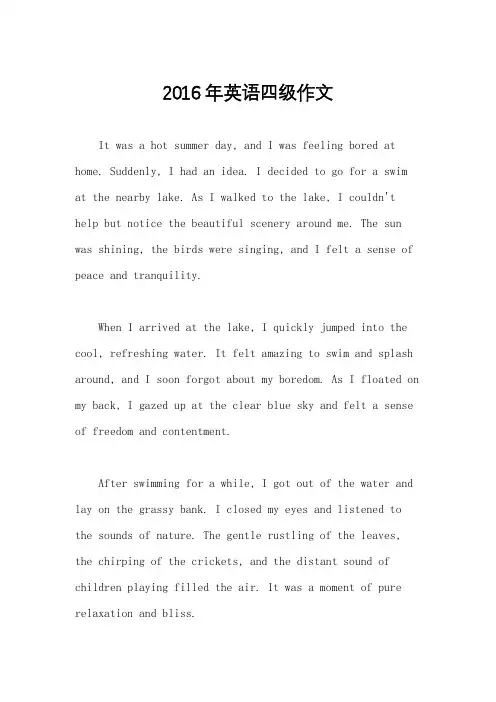
2016年英语四级作文It was a hot summer day, and I was feeling bored at home. Suddenly, I had an idea. I decided to go for a swim at the nearby lake. As I walked to the lake, I couldn't help but notice the beautiful scenery around me. The sun was shining, the birds were singing, and I felt a sense of peace and tranquility.When I arrived at the lake, I quickly jumped into the cool, refreshing water. It felt amazing to swim and splash around, and I soon forgot about my boredom. As I floated on my back, I gazed up at the clear blue sky and felt a sense of freedom and contentment.After swimming for a while, I got out of the water and lay on the grassy bank. I closed my eyes and listened to the sounds of nature. The gentle rustling of the leaves, the chirping of the crickets, and the distant sound of children playing filled the air. It was a moment of pure relaxation and bliss.As the sun began to set, I reluctantly gathered my things and started to make my way back home. The sky was painted with vibrant hues of orange and pink, and the air was filled with the scent of flowers. It was a beautiful end to a perfect day.Arriving home, I felt rejuvenated and grateful for the simple pleasures in life. I realized that sometimes, all it takes is a spontaneous decision to go for a swim to lift my spirits and bring me joy. I made a mental note to do it more often.。
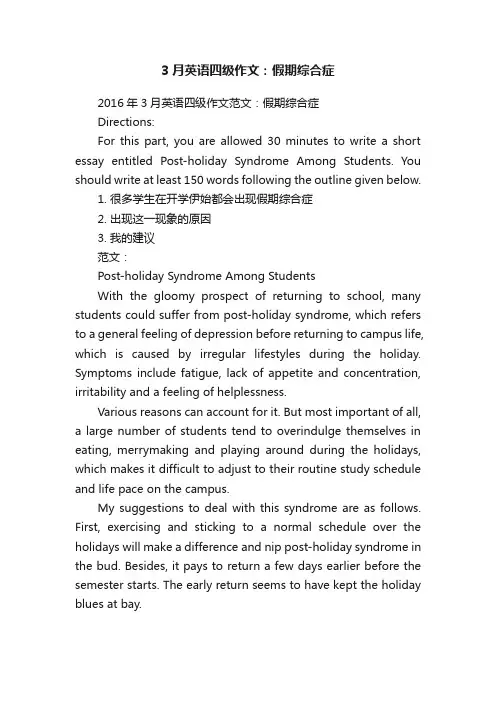
3月英语四级作文:假期综合症2016年3月英语四级作文范文:假期综合症Directions:For this part, you are allowed 30 minutes to write a short essay entitled Post-holiday Syndrome Among Students. You should write at least 150 words following the outline given below.1. 很多学生在开学伊始都会出现假期综合症2. 出现这一现象的原因3. 我的建议范文:Post-holiday Syndrome Among StudentsWith the gloomy prospect of returning to school, many students could suffer from post-holiday syndrome, which refers to a general feeling of depression before returning to campus life, which is caused by irregular lifestyles during the holiday. Symptoms include fatigue, lack of appetite and concentration, irritability and a feeling of helplessness.Various reasons can account for it. But most important of all, a large number of students tend to overindulge themselves in eating, merrymaking and playing around during the holidays, which makes it difficult to adjust to their routine study schedule and life pace on the campus.My suggestions to deal with this syndrome are as follows. First, exercising and sticking to a normal schedule over the holidays will make a difference and nip post-holiday syndrome in the bud. Besides, it pays to return a few days earlier before the semester starts. The early return seems to have kept the holiday blues at bay.。
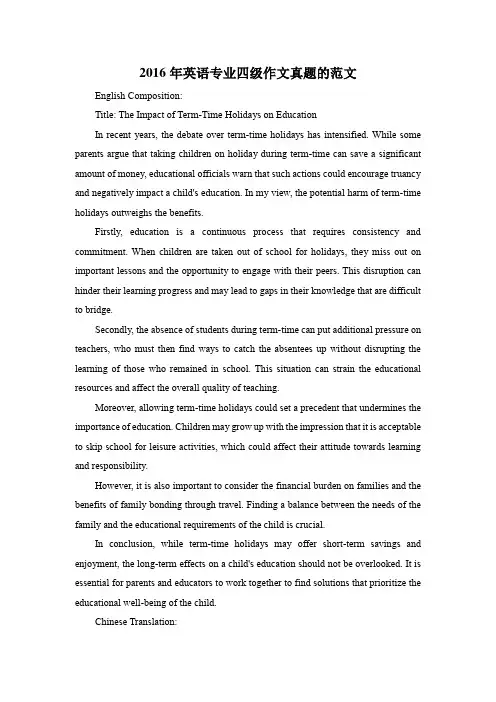
2016年英语专业四级作文真题的范文English Composition:Title: The Impact of Term-Time Holidays on EducationIn recent years, the debate over term-time holidays has intensified. While some parents argue that taking children on holiday during term-time can save a significant amount of money, educational officials warn that such actions could encourage truancy and negatively impact a child's education. In my view, the potential harm of term-time holidays outweighs the benefits.Firstly, education is a continuous process that requires consistency and commitment. When children are taken out of school for holidays, they miss out on important lessons and the opportunity to engage with their peers. This disruption can hinder their learning progress and may lead to gaps in their knowledge that are difficult to bridge.Secondly, the absence of students during term-time can put additional pressure on teachers, who must then find ways to catch the absentees up without disrupting the learning of those who remained in school. This situation can strain the educational resources and affect the overall quality of teaching.Moreover, allowing term-time holidays could set a precedent that undermines the importance of education. Children may grow up with the impression that it is acceptable to skip school for leisure activities, which could affect their attitude towards learning and responsibility.However, it is also important to consider the financial burden on families and the benefits of family bonding through travel. Finding a balance between the needs of the family and the educational requirements of the child is crucial.In conclusion, while term-time holidays may offer short-term savings and enjoyment, the long-term effects on a child's education should not be overlooked. It is essential for parents and educators to work together to find solutions that prioritize the educational well-being of the child.Chinese Translation:标题:学期中假期对教育的影响近年来,关于学期中假期的辩论愈演愈烈。
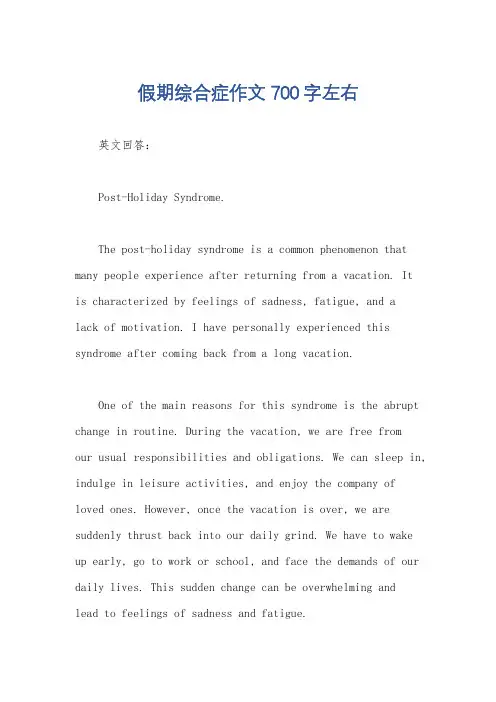
假期综合症作文700字左右英文回答:Post-Holiday Syndrome.The post-holiday syndrome is a common phenomenon that many people experience after returning from a vacation. Itis characterized by feelings of sadness, fatigue, and alack of motivation. I have personally experienced this syndrome after coming back from a long vacation.One of the main reasons for this syndrome is the abrupt change in routine. During the vacation, we are free fromour usual responsibilities and obligations. We can sleep in, indulge in leisure activities, and enjoy the company of loved ones. However, once the vacation is over, we are suddenly thrust back into our daily grind. We have to wake up early, go to work or school, and face the demands of our daily lives. This sudden change can be overwhelming andlead to feelings of sadness and fatigue.Another reason for the post-holiday syndrome is the feeling of nostalgia. We often create wonderful memories during our vacations, and the thought of leaving those memories behind can be quite depressing. We miss the beautiful beaches, the delicious food, and the carefree moments. This longing for the past can make it difficult to adjust to our normal lives.Furthermore, the post-holiday syndrome can also be attributed to the pressure of expectations. We often have high expectations for our vacations, hoping for relaxation, adventure, or personal growth. However, the reality may not always meet our expectations. We may encounter unforeseen challenges, experience disappointment, or feel like wedidn't make the most of our time off. This discrepancy between expectations and reality can lead to a sense of dissatisfaction and a lack of motivation.中文回答:假期综合症。
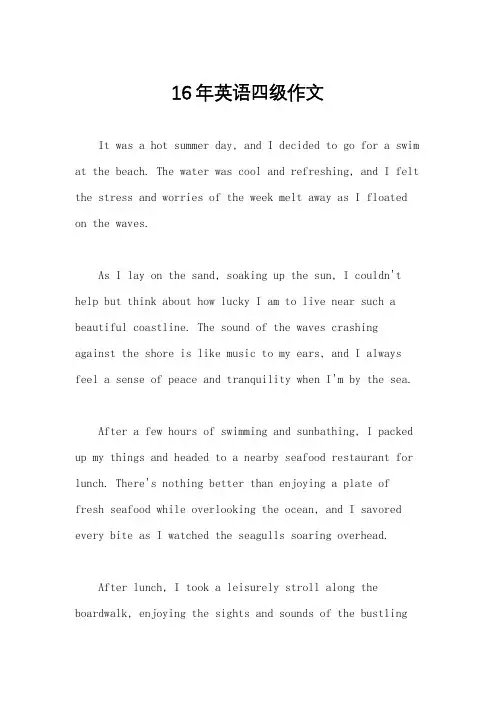
16年英语四级作文It was a hot summer day, and I decided to go for a swim at the beach. The water was cool and refreshing, and I felt the stress and worries of the week melt away as I floated on the waves.As I lay on the sand, soaking up the sun, I couldn't help but think about how lucky I am to live near such a beautiful coastline. The sound of the waves crashing against the shore is like music to my ears, and I always feel a sense of peace and tranquility when I'm by the sea.After a few hours of swimming and sunbathing, I packed up my things and headed to a nearby seafood restaurant for lunch. There's nothing better than enjoying a plate of fresh seafood while overlooking the ocean, and I savored every bite as I watched the seagulls soaring overhead.After lunch, I took a leisurely stroll along the boardwalk, enjoying the sights and sounds of the bustlingbeach town. The smell of saltwater and sunscreen filled the air, and I couldn't help but smile as I passed by families playing in the sand and couples walking hand in hand.As the sun began to set, I made my way back to the beach to watch the beautiful colors painting the sky. The sky was a mix of pinks, oranges, and purples, and I felt a sense of awe and wonder as I watched the sun dip below the horizon.As I drove home, I couldn't help but feel grateful for the day I had spent by the sea. The beach has a way of rejuvenating my spirit and reminding me of the beauty and wonder of the natural world. I can't wait to go back again soon.。
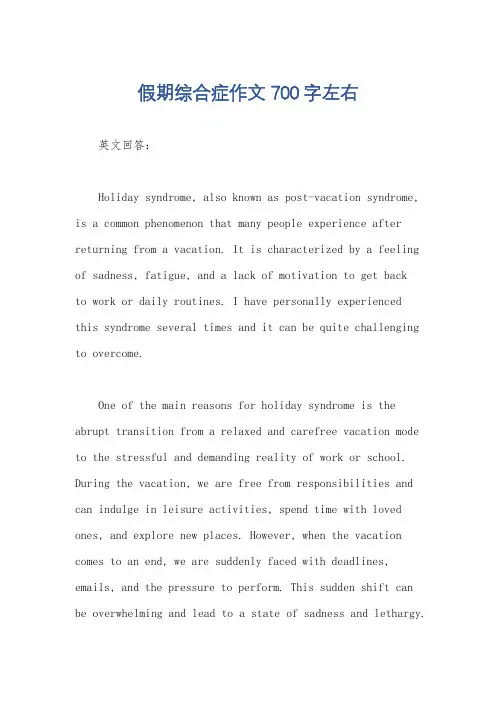
假期综合症作文700字左右英文回答:Holiday syndrome, also known as post-vacation syndrome, is a common phenomenon that many people experience after returning from a vacation. It is characterized by a feeling of sadness, fatigue, and a lack of motivation to get backto work or daily routines. I have personally experiencedthis syndrome several times and it can be quite challenging to overcome.One of the main reasons for holiday syndrome is the abrupt transition from a relaxed and carefree vacation mode to the stressful and demanding reality of work or school. During the vacation, we are free from responsibilities and can indulge in leisure activities, spend time with loved ones, and explore new places. However, when the vacation comes to an end, we are suddenly faced with deadlines, emails, and the pressure to perform. This sudden shift can be overwhelming and lead to a state of sadness and lethargy.Another factor that contributes to holiday syndrome is the feeling of nostalgia for the enjoyable moments and experiences we had during the vacation. We may find ourselves longing for the freedom, excitement, and relaxation that we experienced during that time. This longing can make it difficult to focus on the present and accept the reality of returning to our daily routines.Furthermore, holiday syndrome can also be exacerbated by the fear of missing out (FOMO). When we see our friends or colleagues sharing their vacation photos and stories on social media, we may feel a sense of envy and regret for not making the most of our own vacation. This comparison can intensify the post-vacation blues and make it harder to adjust to our regular lives.To overcome holiday syndrome, it is important to gradually ease back into our daily routines and responsibilities. Setting small goals and tasks can help us regain a sense of control and accomplishment. Additionally, practicing self-care activities such as exercise,meditation, and spending time with loved ones can helpboost our mood and motivation.中文回答:假期综合症,也被称为假后综合症,是许多人在假期结束后经历的一种常见现象。
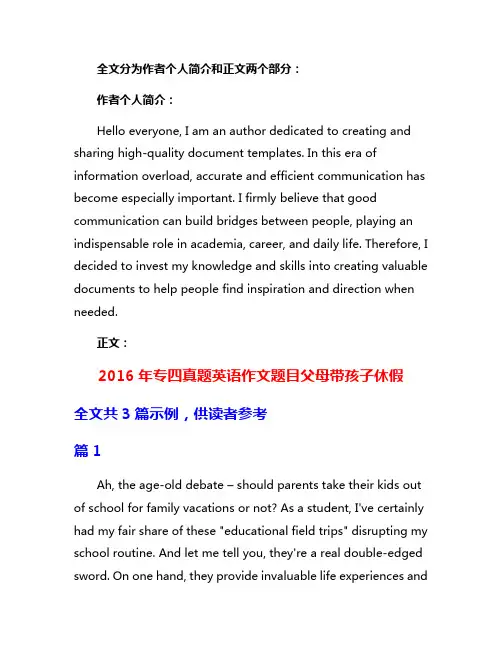
全文分为作者个人简介和正文两个部分:作者个人简介:Hello everyone, I am an author dedicated to creating and sharing high-quality document templates. In this era of information overload, accurate and efficient communication has become especially important. I firmly believe that good communication can build bridges between people, playing an indispensable role in academia, career, and daily life. Therefore, I decided to invest my knowledge and skills into creating valuable documents to help people find inspiration and direction when needed.正文:2016年专四真题英语作文题目父母带孩子休假全文共3篇示例,供读者参考篇1Ah, the age-old debate – should parents take their kids out of school for family vacations or not? As a student, I've certainly had my fair share of these "educational field trips" disrupting my school routine. And let me tell you, they're a real double-edged sword. On one hand, they provide invaluable life experiences andbonding time with the family. But on the other, they can seriously throw a wrench into your academic momentum. So which side of the fence do I stand on? Well, grab a pen and buckle up, because I'm about to take you on a wild ride through the pros and cons of this heated issue.Let's start with the case for vacation time. After all, what's the point of all that backbreaking studying if you can't even enjoy the fruits of your labor? Life is more than just textbooks and test scores – it's about exploring new horizons, immersing yourself in different cultures, and creating lasting memories with your loved ones. And let's be honest, those classroom lectures on ancient civilizations or geographical wonders just can't compare to actually walking through the ruins of Machu Picchu or diving into the crystal-clear waters of the Great Barrier Reef.Speaking from experience, some of my most cherished childhood memories stem from family vacations. Like that time we went on a road trip across the American Southwest, marveling at the grandeur of the Grand Canyon and getting up close and personal with those massive Joshua trees in the Mojave Desert. Or that unforgettable summer we spentisland-hopping in Greece, feasting on mouth-watering Mediterranean cuisine and touring ancient archaeological sitesthat made my history textbooks come to life. Those are the kinds of experiences that shape your worldview and stick with you for a lifetime.But let's not forget the educational benefits of travel, either. Immersing yourself in different cultures and environments is like an interactive crash course in sociology, anthropology, and geography all rolled into one. You learn to appreciate diverse traditions, develop a more nuanced understanding of global issues, and maybe even pick up a new language or two along the way. Heck, I'd argue that a well-planned family excursion can be just as valuable (if not more so) than sitting through another mind-numbing lecture on the principles of supply and demand.Of course, the opposition will inevitably cry "But what about the disruption to your studies?" And sure, I can't deny that taking extended breaks from school can throw a major wrench into your academic momentum. After all, it's tough to stay focused on calculus derivatives or literary analysis when you've got the siren call of sun-drenched beaches and exotic locales beckoning you.There's also the logistical nightmare of making up missed work, catching up on lessons, and potentially falling behind your peers. I've definitely had my fair share of late-night cram sessionsand stress-induced breakdowns trying to get back up to speed after an extended vacation. It's a real pain in the you-know-what.But here's the thing – a little adversity never hurt anyone. In fact, I'd argue that navigating those challenges and developing the discipline to refocus on your studies after a lengthy break is an invaluable life skill. It teaches you time management, prioritization, and perseverance – traits that will serve you well no matter what path you pursue.At the end of the day, it all comes down to striking that delicate balance. Sure, excessive absences or poorly timed vacations can seriously derail your academic progress. But an occasional, well-planned family getaway? That's an investment in your personal growth and lifelong education that's worth every missed class period.So, dear parents, by all means, whisk your kids away on amazing adventures from time to time. Expose them to the wonders of the world beyond their textbooks and classroom walls. Just make sure to work closely with their teachers, have a solid plan for making up missed work, and instill in them the discipline to stay on top of their studies when they return.As for my fellow students out there? Don't be so quick to scoff at the idea of family vacations. Keep an open mind andrecognize them for the incredible growth opportunities they are. Who knows – that week of snorkeling in the Maldives or hiking through the Andes mountains might just inspire your next great passion or career pursuit. And at the very least, you'll walk away with a wealth of experiences and memories that'll last a lifetime.Because at the end of the day, what's the point of all that relentless studying and academic achievement if you can't take a step back every once in a while to actually live a little? Food for thought, my friends. Food for thought.篇2Vacations are supposed to be a time of rest, relaxation, and making happy memories with loved ones. However, for many students like myself, family vacations can often turn into a source of stress and frustration rather than joy and rejuvenation. The 2016 TEM-8 exam essay question asking whether parents should take their children on vacation raises some important points about the pros and cons of this practice that are worth examining.From my personal experience, I have to say that I generally dread going on vacation with my parents. Don't get me wrong, I love my family dearly. But there always seems to be an inevitableclash of expectations, desires and personalities whenever we travel together that leaves me mentally and emotionally exhausted rather than refreshed upon returning home.The first major issue is the loss of personal freedom and autonomy. As a university student, I've grown quite accustomed to coming and going as I please, making my own decisions about how to spend my time. But when I'm on vacation with my parents, it often feels like I've be transported back to my childhood, with my every move scheduled and monitored. My parents like to plan every minute detail of our trips, leaving no room for spontaneity or just "going with the flow." There's this unspoken expectation that I'll obediently follow their lead, sticking to predetermined itineraries and activity schedules that may or may not actually align with my own interests and energy levels on a given day.I vividly recall one excruciating family trip we took to Beijing when I was 18 years old. We hit what felt like every tourist trap in the city, hustling from the Forbidden City to Tiananmen Square to the Summer Palace and beyond, checking items off my parents' must-see list while I desperately tried to keep up,jet-lagged and overwhelmed. By the fifth day, I was so cranky and burnt out that I refused to leave the hotel room, much to myparents' dismay. In hindsight, some flexibility and alone time probably would have served me well on that trip.Speaking of alone time, that's another hot commodity that is sorely lacking on family vacations. As an introvert, I need plenty of quiet solitude to recharge my batteries, away from the constant interactions, decision-making and stimulation of group travel. But with mom, dad and maybe even siblings in tow 24/7, there's just no escaping that exhausting phenomenon of "constant crowd." I can never truly relax and be myself because I'm always "on" around my family, consciously or subconsciously monitoring my words and behavior through an intrinsic lens of meeting their expectations as the "good son/daughter." The mental strain of keeping up that perfected image is draining.Money is also a major source of tension. Having grown up in a Chinese household, I'm quite accustomed to my parents' frugality and their penchant for nickel-and-diming every expense down to the last fen. While cost-consciousness is admirable in many ways, it can also really put a damper on vacation vibes. I can't tell you how many arguments I've witnessed or gotten unwillingly dragged into regarding restaurant choices, hotel upgrades, admission fees, you name it. My parents will fuss endlessly about overpriced this andunnecessary that, completely sucking the joy out of what's supposed to be a relaxing experience. Vacations by nature involve some extra spending, but this seems to cause undue angst and strife within my frugal family.Furthermore, there's simply a growing gap between my lifestyle preferences and those of my parents as I've grown older. They still seem to expect me to fall in line with traditional cultural norms and behaviors, while I've increasingly forged my own identity and desires as a modern, independent young adult. The differences in our personalities, outlooks and priorities become markedly clear and increasingly clash in the close quarters of a family vacation.To use a shallow but illustrative example: My parents are routine early risers, wanting to wake up with the roosters to "seize the day," a habit shaped by decades of adhering to rigid work schedules. Me? As a night-owl student, I'd rather sleep in as late as possible to rest up before activities, a preference that drives my parents' nuts because they consider it "laziness." Cue the morning squabbles about being on time and not wasting precious vacation hours. Culinary and entertainment differences provide ample fuel for such conflicts as well. The list goes on and on.At the end of the day, I realize that my parents' intentions are almost always pure; they simply want to spend quality time together as a family, make wonderful memories, and experience the world beyond our insular day-to-day lives. And I respect and appreciate those loving motivations, I really do.However, from my young adult vantage point, I've come to believe that family vacations often do more harm than good in creating unity and lasting happy memories. The stress, squabbling and sacrifices of individual needs tend to outweigh any fleeting magical moments. There has to be a better way to nurture healthy family bonding and relationships aside from these forced extended hangouts in foreign environments.My ideal solution? Why not take separate vacations - one for the parents, one for the kids - and then reconvene afterward to recap the rejuvenating adventures andorus shared experiences? That way, we can enjoy independent exploration suited to our own pace and preferences, while avoiding the interpersonal pressure cooker scenario of overthinking every moment together. A little absence could Indeed make the heart grow fonder rather than nitpicking at every annoying habit. Just a thought.In summary, while I understand and respect why parents want to take their children on vacations, I personally don't believe the reality always lives up to the warm-and-fuzzy fantasy. Personality clashes, loss of freedom, financial tensions and generational gaps in needs and interests can quickly turn a family getaway into a regrettable confrontation. Of course, every family's situation is unique, so this is just one perspective from a student's point of view. I'm sure there are plenty of examples where multi-generational vacations went off without a hitch. But in my experience, a little more personal space and individual autonomy can go a long way toward leaving everyone refreshed and the family unit intact rather than fractured by a failedgroup trip.篇3Family Vacations: A Cherished Tradition and an Investment in Lifelong MemoriesAs a university student, I have vivid and fond memories of the vacations my parents took me on when I was a child. Those trips were not just enjoyable getaways, but also opportunities to bond as a family and create lasting memories that have shaped who I am today.I still vividly recall the excitement of packing my little suitcase, the thrill of travelling to new places, and the joy of experiencing different cultures, cuisines, and landscapes. Whether it was a road trip to a nearby city, a camping adventure in the great outdoors, or a flight to an exotic destination, each vacation held a sense of wonder and adventure that ignited my curiosity about the world.More importantly, these family vacations allowed us to escape the daily routines and stresses of life, giving us quality time together that strengthened our relationships. Away from the distractions of work, school, and household chores, we could truly be present with one another, sharing laughter, making memories, and creating bonds that have withstood the test of time.One of the most valuable lessons I learned from our family vacations was the art of communication. Long car rides or lazy beach days provided ample opportunities for conversations that might not have happened amid the hustle and bustle of everyday life. We discussed our dreams, shared our thoughts and feelings, and learned to listen to one another with patience and understanding.Moreover, family vacations exposed me to diverse cultures and ways of life, broadening my perspective and instilling in me a sense of appreciation for the world's rich tapestry of traditions and customs. Whether we were exploring ancient ruins, trying exotic foods, or simply observing the daily rhythms of a foreign land, these experiences taught me to embrace differences and cultivate empathy for others.Undoubtedly, the financial investment required for family vacations can be a burden for many households. However, I firmly believe that the memories, life lessons, and emotional bonds forged during these trips are priceless and far outweigh the monetary costs. After all, what could be more valuable than creating cherished moments that will be etched in our hearts forever?As I reflect on my own childhood experiences, I am filled with gratitude for the sacrifices my parents made to provide us with these unforgettable vacations. Their commitment to nurturing our family bond and exposing us to the wonders of the world has left an indelible mark on my life, shaping my values, resilience, and appreciation for the simple joys that come from spending quality time with loved ones.In today's fast-paced and technology-driven world, where families often struggle to find quality time together, the importance of family vacations cannot be overstated. These trips offer a respite from the daily grind, fostering emotional connections, creating lasting memories, and instilling a sense of adventure and curiosity that can enrich our lives in countless ways.To all the parents out there, I encourage you to prioritize family vacations, no matter how modest or ambitious they may be. Whether it's a weekend camping trip or an international adventure, the experiences and memories you create will be treasured by your children for a lifetime. And to my fellow students, cherish these moments with your loved ones, for they are the foundation upon which lifelong bonds and invaluable life lessons are built.In the end, family vacations are not just about the destinations or activities; they are about the journey itself – a journey of love, laughter, and lifelong memories that will forever bind us together as a family.。
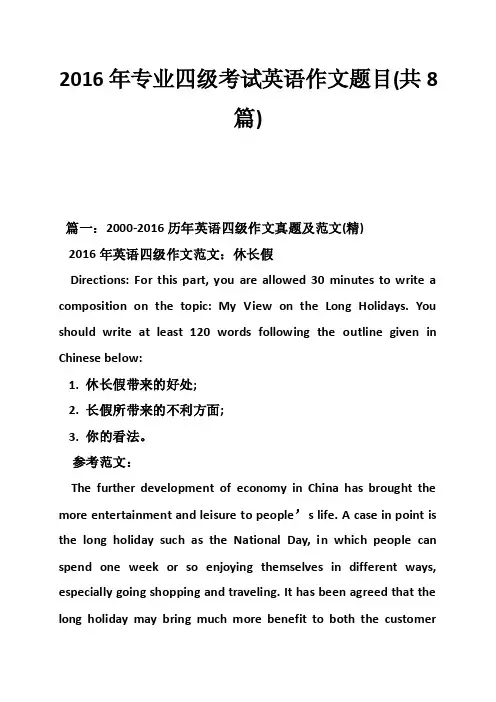
2016年专业四级考试英语作文题目(共8篇)篇一:2000-2016历年英语四级作文真题及范文(精)2016年英语四级作文范文:休长假Directions: For this part, you are allowed 30 minutes to write a composition on the topic: My View on the Long Holidays. You should write at least 120 words following the outline given in Chinese below:1. 休长假带来的好处;2. 长假所带来的不利方面;3. 你的看法。
参考范文:The further development of economy in China has brought the more entertainment and leisure to people’s life. A case in point is the long holiday such as the National Day, in which people can spend one week or so enjoying themselves in different ways, especially going shopping and traveling. It has been agreed that the long holiday may bring much more benefit to both the customerand the businessmen.On the other hand, however, the long holiday also brings much expectable problems to the society. First, too many visitors in the long holidays have caused the strain in traffic. Second, the visitors like to go to the well-known interesting places, which may lead to the seriousdamage to the nature and the scene.In my view, people need such long holidays, and what really matters is how to guide people in their entertainment. For example, it isadvisable that people try to avoid going shopping or traveling in the rush days. Anyway, the long holiday is a good idea of satisfying both the people and the merchants.2015年6月大学英语四级考试作文真题及范文How Will Our Life Go on without Internet?If asked whether the Internet is the greatest discovery of the 20th century, my answer would be yes. The Internet has drawn the world closer together, realized countless incredible dreams, and provided modern people with a great many conveniences and a brilliant life. Today, many people simply feel they cannot live without the Internet. Governments publish their latest policies and decisions online for worldwide recognition. Political campaigns are oftendone online to gain wider public support. Companies and enterprises resort to the Internet for more businessopportunities and potential customers home and abroad. Universities and researchers turn to the Internet if they’d seek international cooperation or funding. Common folks like us also rely on the cyber world in various ways, for communication, entertainment, banking and shopping.True, the power of the Internet is all pervasive and its many negative effects are already visible. For example, Internet addicts tend to withdraw to their own fantasy world rather than communicate with a real person. Children are exposed to online pornography and violence. Internet frauds are an everyday occurrence. In view of all this, you are advised to use the Internet with wisdom. Keep it at a safe distance and never lose yourself.范文一As is clearly depicted in the above picture, a daughter tells his mother a piece of good news that she has been admitted to a university as her mother desires. There is no denial in saying that the cartoon leaves us such a deep impression that we cannot help thinking over a question: What role should parents play in their children’s growth?From my point of view, during the process of a child’s growth, therole of parents is mainly listed as the following two aspects. On one hand, there is no doubt that parents are liable to take good care of their children. On the other hand, in children’s personal growth, parents ought to play a role as a person who helps children develop self-dependence, which carries more significant to children’s future life. In other words, parents should encourage their sons or daughters to be independent rather than reliant on others.To conclude, in children’s personal growth, parents are responsible to care for their children. However, considering that they will grow up and live their own life in some day, parents should enable their children to acquire the ability to be self-independent.Go to school, the right choiceAs is vividly depicted in the cartoon given above, we can observe that a son, holding a smart phone, says to his mom, “why am I going to school if my phone already knows everything?”there is no doubt that the picture strongly reflects that phenomenon that more and more students object the idea of going to school when they have a phone, which can help them know everything. However, it is by no means a sensible idea.It is generally acknowledged that going to school is not outdated. Whereas, it will remain as vital as it used to be. To begin with, going to school makes it possible to study with classmates and makeprogress together. As the old saying goes, “many hands make light work.”If students can study together, they can arouse the interest and cooperate with each other, thus making study more easy and enjoyable. What’s more, going to school means theface-to-face communication. It goes without saying that this way is more direct and effective, where we can raise questions and solve all the questions on spot. Last but not least, mobile phones cannot replace school. When using mobile phones. There are more chances for students to distract their attention. In addition, they may easily addicted to the games on the phone.On the whole, as far as I am concerned, mobile phones do help us study in some ways. Nevertheless, it can by no means replace go to school. Going to school is the sensible choice. And school is the place where you can benefit the most.2014年12月英语四级作文题目:印象最深的课程2014年12月20日大学英语四级考试已经结束,由于本次考试为多题多卷,写作部分共有三个题目:①A course that has impressed you most in college; ②A campus activity that has benefited most. ③A classmate of yours who has influenced you most in college;作文题目一:大学里最难忘的课(沪江网校版)When talking about the course which impresses me the most, Iwill certainly choose Basic Chemical Experiment. As a student of science, I am always fascinated with the magic in test tubes, and from this course I gained more than pure knowledge。
The concept of holiday syndrome is a phenomenon that many people experience after a period of vacation or time off from work.It is characterized by a range of symptoms that can affect ones physical and mental wellbeing,making it difficult to return to the normal routine and responsibilities.Heres a detailed look at what holiday syndrome entails and how it can be managed.Understanding Holiday SyndromeHoliday syndrome,also known as postvacation blues,typically sets in after a break from the usual daily grind.It can be triggered by various factors,including:Disruption of Routine:A sudden shift from a relaxed vacation schedule to a structured work routine can cause stress and anxiety.Excessive Leisure:Too much free time during holidays can lead to a lack of motivation and difficulty in readjusting to a more active lifestyle.Social Isolation:Returning from a holiday often means leaving behind the social interactions and new friendships formed during the trip.Financial Stress:The financial burden of holiday expenses can lead to stress and affect ones mood upon returning to work.Symptoms of Holiday SyndromeIndividuals suffering from holiday syndrome may exhibit a range of symptoms,such as:Fatigue:Feeling tired and lacking energy,even after a restful vacation. Irritability:Being more easily annoyed or frustrated than usual.Difficulty Concentrating:Struggling to focus on tasks at hand.Depression:Experiencing a sense of sadness or a low mood.Insomnia:Having trouble falling asleep or staying asleep.Lack of Appetite:Not feeling hungry or experiencing changes in eating habits.Coping StrategiesTo overcome holiday syndrome,consider implementing the following strategies:Gradual Transition:Ease back into your routine by gradually increasing your workload and responsibilities.Physical Activity:Engage in regular exercise to boost energy levels and improve mood. Social Connections:Stay in touch with friends and colleagues to maintain a sense of community and support.Financial Planning:Manage holiday expenses by budgeting and saving throughout the year to avoid postholiday financial stress.Mindfulness Practices:Incorporate mindfulness techniques,such as meditation or yoga, to reduce stress and improve mental clarity.Professional Help:Seek the assistance of a mental health professional if symptoms persist and interfere with daily life.ConclusionHoliday syndrome is a common occurrence that can affect anyone,regardless of the length or nature of their vacation.By understanding the causes and symptoms,and by implementing effective coping strategies,individuals can mitigate the impact of holiday syndrome and return to their daily routines with greater ease and less stress.Its important to remember that while vacations are meant to be enjoyable and rejuvenating,they are also a temporary break from our regular lives,and its natural to feel a sense of adjustment upon returning to the norm.。
Introduction:Summer vacation is a much-anticipated break for college students,offering them an opportunity to relax, unwind, and engage in activities that can contribute to their personal and academic growth. In this essay, we will discuss the importance of summer vacation for college students, focusing on the physical, mental, and academic benefits it brings.Body:1. Physical BenefitsDuring the academic year, college students often experience a sedentary lifestyle due to long hours of studying and limited time for physical activities. Summer vacation provides an excellent opportunity for students to engage in outdoor activities, such as hiking, swimming, or cycling, which can improve their physical fitness and overall health.By participating in sports or fitness programs, students can build muscle strength, enhance flexibility, and improve cardiovascular health. Moreover, regular exercise has been shown to reduce stress levels and boost mood, which is crucial for maintaining a healthy lifestyle.2. Mental Health BenefitsThe academic pressure can be overwhelming for many college students, leading to stress, anxiety, and burnout. Summer vacation offers a much-needed break from the rigorous academic schedule, allowing students to recharge their mental batteries.During the summer, students can engage in activities that promote relaxation and mental well-being, such as meditation, yoga, or simply spending time with friends and family. These activities can helpstudents develop resilience, improve their problem-solving skills, and enhance their ability to cope with stress.3. Academic BenefitsWhile summer vacation is primarily a time for relaxation, it also presents valuable opportunities for academic growth. Many studentschoose to take advantage of the break by enrolling in summer courses, internships, or research projects.By taking summer courses, students can catch up on missed credits, accelerate their degree completion, or explore new subjects of interest. Additionally, internships and research projects provide practical experience, networking opportunities, and a competitive edge in the job market.4. Personal DevelopmentSummer vacation is an ideal time for college students to develop new skills, hobbies, and interests. By engaging in activities such as learning a new language, volunteering, or traveling, students can broaden their horizons and gain valuable life experiences.These personal development opportunities not only enhance their resumes but also help students build confidence, independence, and a sense of accomplishment. Furthermore, the diverse experiences gained during summer vacation can contribute to a well-rounded character and prepare students for the challenges of the real world.5. Social BenefitsSummer vacation is a great time for college students to reconnect with friends and family. By spending quality time with loved ones, students can strengthen their relationships and create lasting memories.Moreover, summer vacation provides an opportunity for students to meet new people, whether through travel, summer programs, or part-time jobs. These social interactions can enhance their communication skills, cultural awareness, and ability to work in diverse teams.Conclusion:In conclusion, summer vacation holds immense importance for college students. It offers numerous benefits, including physical and mental health improvements, academic growth, personal development, and social connections. While it is crucial for students to take advantage of this time to relax and rejuvenate, engaging in productive activities can alsocontribute to their overall well-being and future success. Therefore, college students should make the most of their summer vacation, balancing relaxation with personal and academic growth.。
假期四级英语作文During the holiday, I had a wonderful time with my family and friends. We went on a trip to the countryside, where we enjoyed the beautiful scenery and fresh air. We also visited some historical sites and learned about the local culture.One of the highlights of the trip was the food. We had some delicious local specialties, such as roasted duck, fried fish, and steamed buns. The ingredients were fresh and the flavors were amazing. We also had some homemade snacks, like dried fruits and nuts, which were healthy and tasty.Apart from the trip, I also spent some time relaxing at home. I read some books, watched some movies, and listened to some music. I also did some exercise, like jogging and yoga, to keep myself fit and healthy. I think it's important to balance work and leisure, and to take care of both our physical and mental health.Overall, the holiday was a great opportunity for me to recharge my batteries and to spend quality time with my loved ones. I feel grateful for the experience and look forward to more adventures in the future.。
英文作文糟糕的假期英文:My holiday was a disaster. I had planned to go to the beach with my friends and have a great time, but unfortunately, things didn't go as planned. Firstly, the weather was terrible. It rained almost every day, and we couldn't go to the beach or do any outdoor activities. Secondly, one of my friends got sick, and we had to takeher to the hospital. This ruined our plans even further as we had to spend most of our time taking care of her. Lastly, we had some issues with our accommodation, and it was notas comfortable as we had hoped.To make matters worse, we had some miscommunications among our group, and there were some arguments and fights. This made the whole holiday experience very unpleasant and stressful. Instead of having a relaxing and enjoyable time, I ended up feeling exhausted and frustrated.In conclusion, my holiday was a complete disaster, and I wish I had stayed at home instead.中文:我的假期糟透了。
2016专四英语作文holidayHolidayThe holiday season is always an exciting time of year, filled with joy, relaxation, and the opportunity to spend quality time with family and friends. For many, it’s a time to escape the daily grind and immerse oneself in the spirit of the season.During the holidays, people often take advantage of the break to travel, visit relatives, or simply enjoy the peace and quiet. It’s a time for giving and receivin g, a time for reflection, and a time for making memories that will last a lifetime.For me, the holidays are a special time. It’s a chance to reunite with family members who live far away and to create new traditions and memories. Whether it’s the bustle of Christmas Eve, the joy of opening presents on Christmas Day, or the simple pleasure of sharing a meal with loved ones, the holidays are always filled with warmth and love.Moreover, the holidays are a time for giving back. Many people choose to volunteer their time and efforts to help those who are less fortunate. It’s a reminder that the true spirit of the holidays is not about the material gifts we give, but about the joy and happiness we spread.In conclusion, the holidays are a time for joy, giving, and reflection. They are a time to cherish the moments we share with those we love and to make the most of the precious time we have. As the year comes to an end, let us all take a moment to appreciate the blessings we have received and to look forward to the new year with hope and optimism.假期假期总是一年中最激动人心的时刻,充满了欢乐、放松和与家人朋友共度美好时光的机会。
2016年英语4级作文It was a hot summer day, and I was feeling bored at home. I decided to call up my friend and see if she wanted to go to the beach. We spent the whole day swimming, sunbathing, and chatting. It was so much fun to just relax and enjoy the beautiful weather.After the beach, we went to a nearby café to grab some dinner. We talked about everything and anything, from our favorite movies to our future plans. It was nice to have some quality time with my friend and catch up on eachother's lives.As the sun started to set, we decided to take a walk along the boardwalk. The cool breeze and the sound of the waves crashing against the shore were so calming. We took some photos and just enjoyed the peaceful atmosphere.After our walk, we headed back home. I dropped myfriend off at her place and went back to my house. I feltso content and happy after spending the day with my friend. It's moments like these that make life so much more enjoyable.Overall, it was a perfect day filled with laughter, good company, and beautiful scenery. I can't wait for our next adventure together.。
2016年四级作文范文:假期症
来源:智阅网
大学英语四级作文并不难。
只要我们在复习的时候,能够端正复习态度,认真复习,经常总结出题规律,我们就能取得不错的成绩。
那么,就来让我们一起熟悉一下听力的做题方法吧!
题目要求:
Directions: For this part, you are allowed 30 minutes to write a short essay entitled Post-holiday Syndrome Among Students. You should write at least 150 words following the outline given below.
1. 很多学生在开学伊始都会出现假期综合症
2. 出现这一现象的原因
3. 我的建议
参考范文:
Post-holiday Syndrome Among Students
With the gloomy prospect of returning to school, many students could suffer from post-holiday syndrome, which refers to a general feeling of depression before returning to campus life, which is caused by irregular lifestyles during the holiday. Symptoms include fatigue, lack of appetite and concentration, irritability and a feeling of helplessness.
Various reasons can account for it. But most important of all, a large number of students tend to overindulge themselves in eating, merrymaking and playing around during the holidays, which makes it difficult to adjust to their routine study schedule and life pace on the campus.
My suggestions to deal with this syndrome are as
follows. First, exercising and sticking to a normal schedule over the holidays will make a difference and nip post-holiday syndrome in the bud. Besides, it pays to return a few days earlier before the semester starts. The early return seems to have kept the holiday blues at bay.
假期症一直是我们大学生存在的通病,也是值得我们关注的一个话题,希望考生们可以认真对待,多积累好词好句,提升自己的写作水平,要加油哦。
2016《大学英语四级考试真题精析与标准预测》这本书对我们的考试帮助很大,考生们要好好利用哦,预祝同学们顺利通过四级考试。